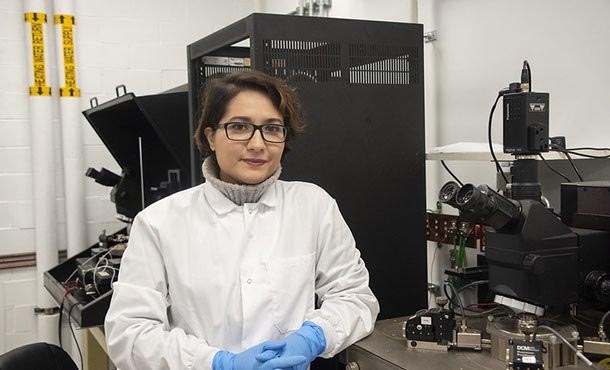
Aida Ebrahimi, assistant professor of electrical engineering, recently was named a 2020 Scialog Fellow. IMAGE: PENN STATE COLLEGE OF ENGINEERING
Electrical engineering assistant professor named 2020 Scialog Fellow
2/3/2020
By Sarah Small
UNIVERSITY PARK, Pa. — Aida Ebrahimi, assistant professor of electrical engineering at Penn State, has been named a 2020 Scialog Fellow. As a fellow, she will participate in the 2020 Scialog: Microbiome, Neurobiology and Disease Initiative, which is sponsored by the Research Corporation for Science Advancement, the Paul G. Allen Frontiers Group and the Frederick Gardner Cottrell Foundation.
Along with other early career Scialog Fellows and distinguished scientific leaders in fields such as chemistry, biology, physics and neuroscience, Ebrahimi will attend annual meetings over the course of three years with “the goal of designing and launching innovative, cross-disciplinary studies with the potential to transform our understanding” of the gut microbiome and the ways in which it affects the brain.
“Dr. Ebrahimi has done pioneering research on chip-based, in situ probing of bacterial cells,” said Kultegin Aydin, department head and professor of electrical engineering. “Her selection as a Scialog Fellow recognizes her potential as a talented researcher who can take on challenging multidisciplinary problems.”
Ebrahimi received her bachelor of science and master of science degrees from the University of Tehran, Iran and her doctorate from Purdue University, all in electrical and computer engineering. Since August 2017, she has been an assistant professor in the Department of Electrical Engineering at Penn State and an intercollege graduate degree program faculty member in the departments of Materials Science and Engineering and Biomedical Engineering.
Ebrahimi’s research revolves around developing in situ techniques for label-free phenotyping of pathogens, point-of-care diagnostics, and the study and application of low-dimensional materials for biochemical sensing for health and environmental monitoring. The results of her research endeavors are published in prestigious journals in the field, including ACS Nano, the Proceedings of the National Academy of Sciences, and Biosensors and Bioelectronics. Ebrahimi is the recipient of several awards and scholarships for outstanding research performance, including the Materials-Life Science Convergence Award (Penn State, 2018), the Humanitarian Materials Award (Penn State, 2017), the Bilsland Dissertation Fellowship Award (Purdue University, 2015), Rising Star in EECS (MIT, 2015) and Meissner Fellowship Award (Purdue University, 2011). Ebrahimi is a member of the Institute of Electrical and Electronics Engineers (IEEE) Electron Device Society, the IEEE Engineering in Medicine and Biology Society, the Electrochemical Society, the Biophysical Society (invited), the Biomedical Engineering Society, and the American Physical Society.
“I am very humbled by this recognition and am so grateful to the electrical engineering department and Penn State for nominating me,” Ebrahimi said. “I look forward to meeting other fellows and distinguished leaders in the field. I especially am very excited to participate in forming groundbreaking ideas related to microbiome and neurological diseases and new research opportunities and collaborative efforts.”



